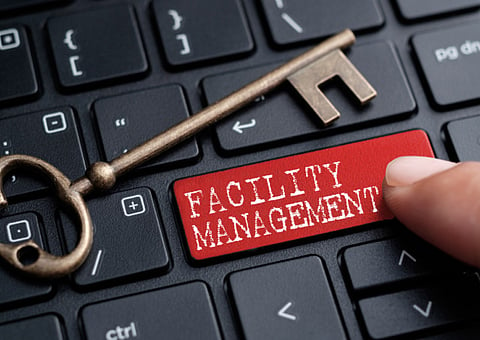Need of the hour: smart facilities management
Jamal Abdullah Lootah of Imdaad, says embracing technology is a key challenge facing the industry

Investment in real estate and infrastructure development continues to gain momentum as the UAE inches closer to 2020, a key target date for most ongoing projects seeking to take advantage of the anticipated economic windfall brought about by the Dubai Expo 2020. To fully realise the long-term benefits of the surge in real estate development, finding innovative ways to effectively manage buildings and building facilities will be critical.
In fact, there is already great demand for facilities management (FM) services in the UAE, according to Jamal Abdullah Lootah, CEO of Imdaad, a leading provider of integrated facilities and waste management solutions in the GCC. Citing recent research, he says the UAE’s FM industry is expected to enjoy a compound annual growth rate (CAGR) of 9 per cent from 2016-2021. “The GCC’s FM industry is vibrant and robust,” he says in an exclusive interview with PW. “The regional sector is definitely on an upswing led by the UAE’s FM market.”
A multi-award winner, Imdaad has expanded its portfolio of services, in step with the changing needs of customers. The company also says that it’s educating and empowering customers to be more profitable and efficient in the maintenance and care of their facilities.
Lootah, a powerhouse and exemplary leader in his own right, talks about Imdaad’s benchmarking efforts and the opportunities and challenges emerging in the industry.
What is the current state of the FM industry in the region? What is driving its growth or decline?
The GCC’s FM industry is vibrant and robust, presenting considerable opportunities to all regional and global players thanks to the region’s strong economic activities. It is definitely on an upswing led by the UAE’s FM market, which is predicted by Research and Markets to experience a CAGR of 9 per cent from 2016-21. This is on account of the huge infrastructure spending in the country in line with the development goals of the UAE Vision 2021, and as part of the country’s efforts to reinforce its non-oil sectors, such as construction and real estate. Tourism will also play a key role in the sector’s substantial expansion. In addition, the emergence of cloud-based solutions is expected to aid the growth of the sector in the next five years.
Which trends will impact the industry the most?
There are numerous trends out there, but the one that we believe will impact the industry the most is the emergence of new cutting-edge technologies. When the latest technological innovations are integrated with best FM practices, facilities managers will be able to deliver world-class solutions in an unprecedented manner. The growing popularity of energy FM services is another trend that will reshape the future of this field.
What are the critical challenges plaguing the industry?
Firstly, there is lack of awareness among organisations about the importance of integrating FM into their overall business development strategy. We aim to bridge this gap by implementing various initiatives highlighting the key role and significance of strategically deploying FM solutions in their bottom line.
Secondly, there is the challenge of integrating new technologies with the FM industry. Next-generation technologies are being developed all the time, and their impact on the business landscape the world over is immeasurable. Imdaad, along with other organisations, is now catching up as we have begun incorporating state-of-the-art tools and making reforms within our system to ensure optimal workflow and productivity.
What is the importance of smart FM, specifically in the UAE and the region?
Smart FM is crucial to the ongoing smart transformation efforts of the UAE and the rest of the region. To keep up with the subsequent changes, building owners are intensifying their efforts to make their facilities more “intelligent” and move away from full manual operations. You need to accordingly implement smart FM, an integral part of smart cities, to achieve these goals. With the advent of the Internet of Things (IoT), smart, connected buildings have become possible, offering huge opportunity to establish a healthier environment for all. Imdaad’s Imtedaad is based on the IoT concept and designed to reduce operational costs.
How do you support the smart city initiatives of the Dubai government?
As we are committed to the public sector’s relevant initiatives, our programmes are aligned with the government’s national development agenda. We will continuously harness the power of software, data analytics and robotics, among others, to contribute to Dubai’s and the UAE’s vision of leading the world in creating smart and sustainable cities. Imtedaad is a concrete reaffirmation of this commitment. Imtedaad can intelligently analyse the performance trends of interconnected assets, making it one of the industry’s much talked-about technological platforms.
Is smart FM also environmentally responsible?
Smart FM and environmentally responsible FM are closely intertwined. Smart FM helps promote environmental protection by harnessing the power of technology. For example, our smart services allows our clients to save on power and other resources.
Where does the FM industry stand with regard to its environmental and social responsibility?
Protecting the environment is part of our social responsibility. In accordance with the UAE Vision 2021, the government has laid down various initiatives to address environment-related concerns, including public awareness and education campaigns. Programmes such as significantly lowering the energy consumption of buildings are important. In the UAE, buildings consume a whopping 80 per cent of energy, which is highly alarming. We must do our part to reverse this cycle.
Additionally, putting recycling bins in all strategic locations in the UAE helps foster a culture of reuse and recycling in our communities. Incentives are needed for those companies that promote environmentally safe products and services to encourage others to follow in their footsteps.



